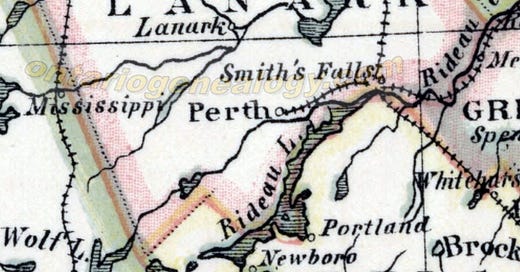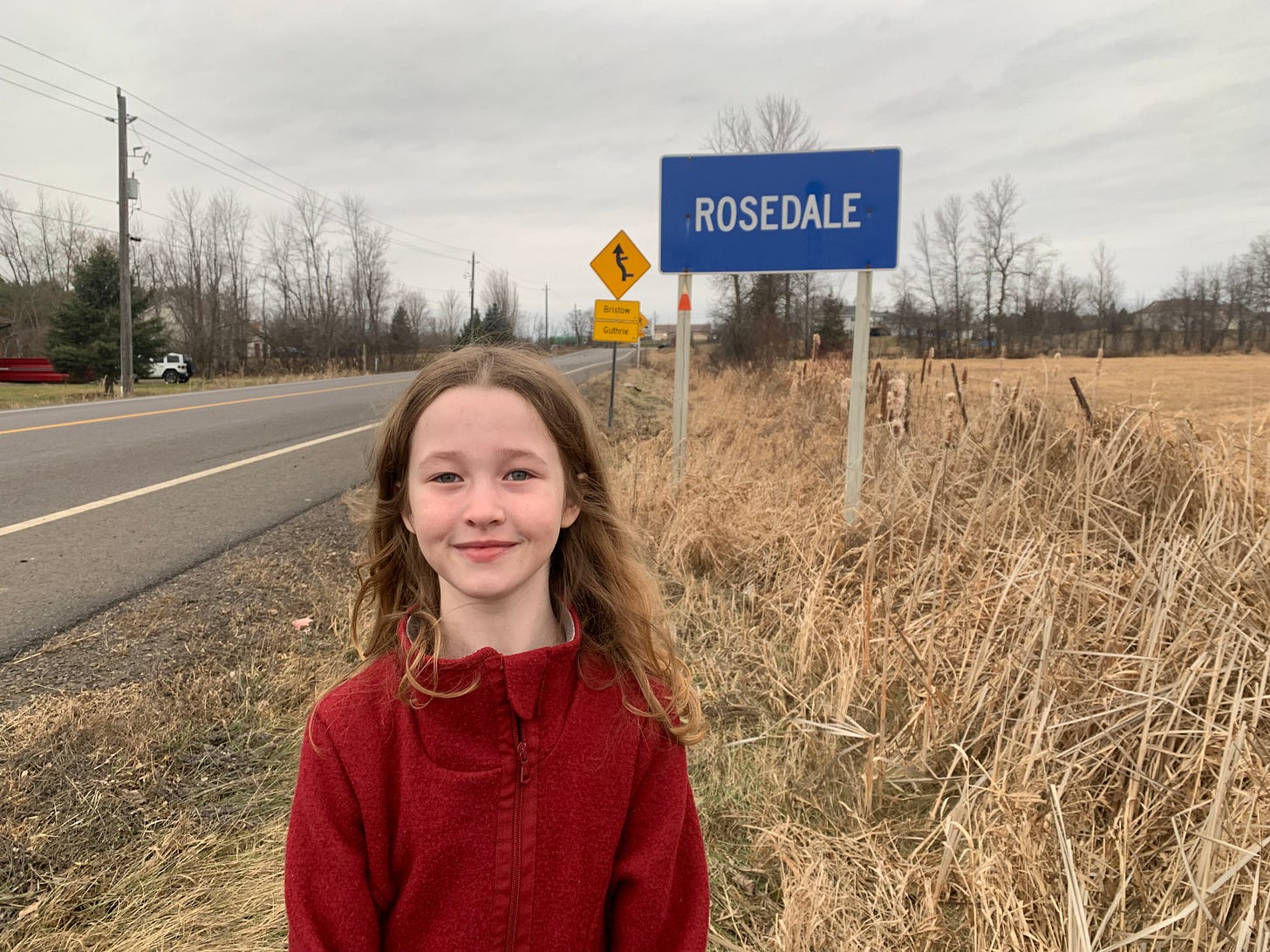the genealogy book
, on Ezekiel Rose (1771-1853) and Rose's Settlement (Rosedale), Lanark County
Lanark County, Ontario, and this history of Roses. Rose’s Settlement, Rose’s Creek, Rosebank, Rosebank Inn, Rosetta and Roseville. The first settler of Montague Township was said to be Ezekiel Rose (1771-1853), son of Samuel Henry Rose UEL. As his father and many of his siblings remained further east, this distant uncle, of innumerable greats, headed west, and into the unconquered woods. Born in Manchester, Bennington, Republic of Vermont, and pushed north from American colonies with his parents and siblings, Ezekiel eventually landed in Montague Township, Lanark County, Upper Canada, surrounded by wife and their plethora of children. Rosedale: a mile north of Kilmarnock, centred on lot 21, second concession. Glenn J. Lockwood’s Smiths Falls: A Social History of the Men and Women in a Rideau Canal Community, 1794-1994 (1994) offers a list of the “few Montague settlers residing near Smyth’s falls” circa 1830 that included “Ezekiel Rose, Jesse McIntyre, Charles Rose, Isaac Lockwood and Moses Rose on the fine soil along the length of Rose’s Creek from the second to the sixth concessions.” Given potentially this local stretch of three Rose siblings, it would suggest the area well named. Jean S. McGill’s A Pioneer History of the County of Lanark (1968) offers: “A village in Montague Township, now known by the railway station Rosedale in honour of Ezekiel Rose, the first settler. The village bore the name Roseville for many years, even after 1859 when a post office was opened and called Montague.” The volume In Search of Lanark (1980), with text by Carol Bennett, offers a bit more:
Rosedale is located about five miles east of Smiths Falls. The township fair was held in this district at one time. First known as Roseville, after a local pioneer family, the community used the name Montague for post office purposes. In those days, both names were used simultaneously. When the railroad went through, the station became known as Rosedale.
The community once had a lady who lived to be a great age. In 1880 she was still alive at the age of 98, having outlived two husbands. Mrs Ezekiel Rose was born in New York State in 1782, moving to Leeds County with her United Empire Loyalist parents when she was very young. In 1802 she married Amasa McIntyre and pioneered in Montague at his side. This was the year that he and his father, Jesse McIntyre, moved to Montague. Jesse located at lot 20, concession 2, and Amasa on lot 21. Jacob Vandusen took up residence on lot 23.
After five years of marriage, Amasa McIntyre died, and Mrs McIntyre subsequently married Ezekiel Rose. They remained on lot 21, and she was still there when interviewed for the County Atlas in 1880.
I’m not sure why Bennett wouldn’t give the woman born Mary Martha Fry (1783-1881) the benefit of her own name. If you visit St. Andrew’s West, just north of Cornwall, Ontario, you can see the gravestone of infamous Scottish-born explorer and North-West company man Simon Fraser “and his wife” (her name was Catherine McDonell, in case you were interested). Was this simply the standard for the era? She wasn’t allowed a name either.
Bennett’s information on Mrs. Rose is a bit skewed, as Ezekiel was her first husband, not her second: the pair married at some point by or in 1794 in Grenville County, Upper Canada. It was with Ezekiel that she had her thirteen children: Chloe, Charles, Mary, Hannah, David, Martha, Lydia, John Henry, Omar, Altha Laura, Alvin Benson, Marintha and Laura Vanseetheart. Some of these names are spectacular, I have to say. Still, Bennett writes that Mary Martha remarried in 1801 as a widow, but Ezekiel lived a further fifty-two years. The census for 1851, 1861 and 1881 all list her as widowed. Clearly, I think I have questions.
There isn’t much information on Ezekiel either. An affidavit by JP Stephen Burrett offers of Ezekial that “He did his duty faithfully as a Sargent of the Militia when called for in the years 1812, 1813 and 1814.” Helping to hold that border, it would seem, from those American invaders. Soon after, for the sake of the lease of the Reserve Lot #21 in the 2nd Concession in the Township of Montague, Ezekiel named his brother Samuel, “yeoman of Wolford, as surety for the regular payment of rent, signed at Montague on June 12, 1815.” By 1820, his was the sole liquor license issued that year in Montague Township, which might not have been unusual given how few families had settled by then. Further on, Howard Morton Brown’s Lanark Legacy: Nineteenth Century Glimpses of an Ontario County (1984) writes that “Cheese factories were established during the 1870s, and in the Roseville factory alone, more than 100,000 pounds of cheese were annually being manufactured by 1878.” What was known as Rose’s Settlement circa 1827 evolved into Roseville and now sits at Rosedale. A shift in perception, naming. My daughter Rose, who would welcome the fact of a town of her own. If there might be a sign. If we might take a picture.






Hey, Rob, these “genealogy book” posts are great! I've shared them with my wife's family in the “Rose (Roosa) Paternal Ancestors” Facebook group I started for them a few days ago.
https://fb.me/g/2B9IfXSIw/D0K9fd6R?